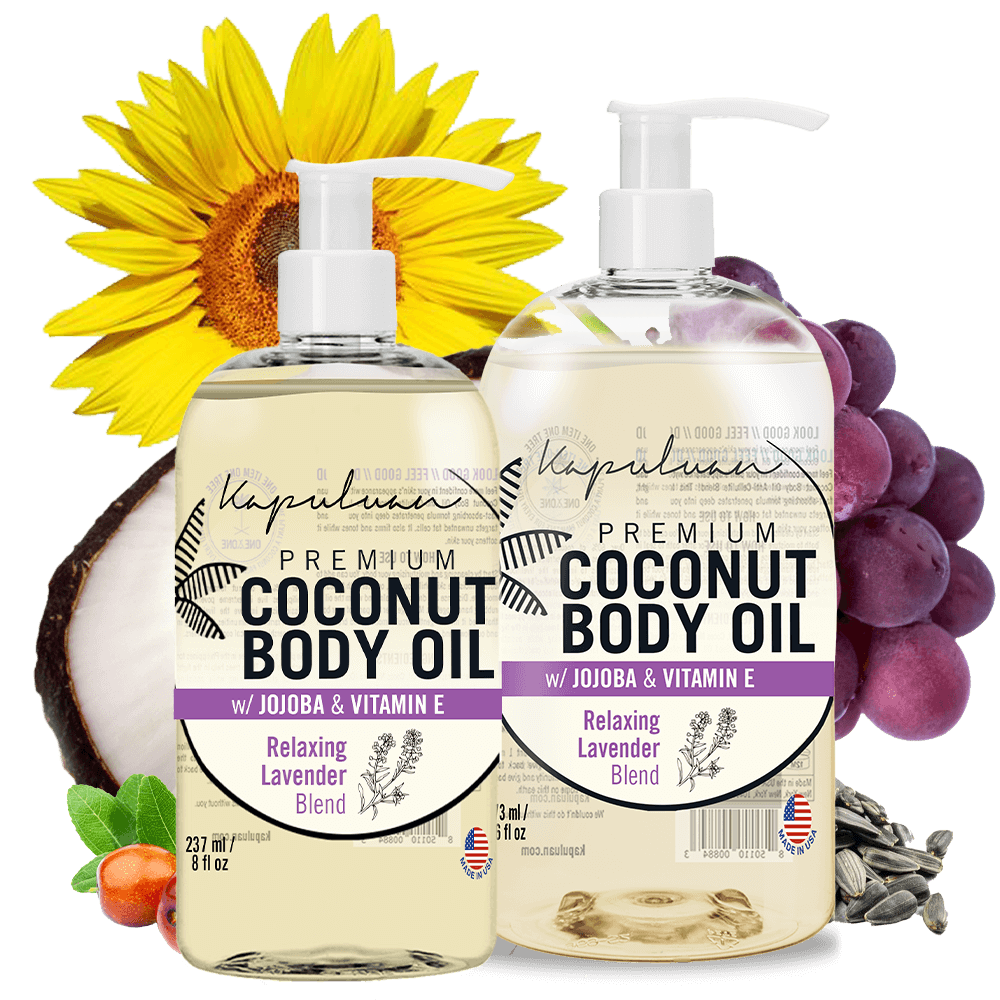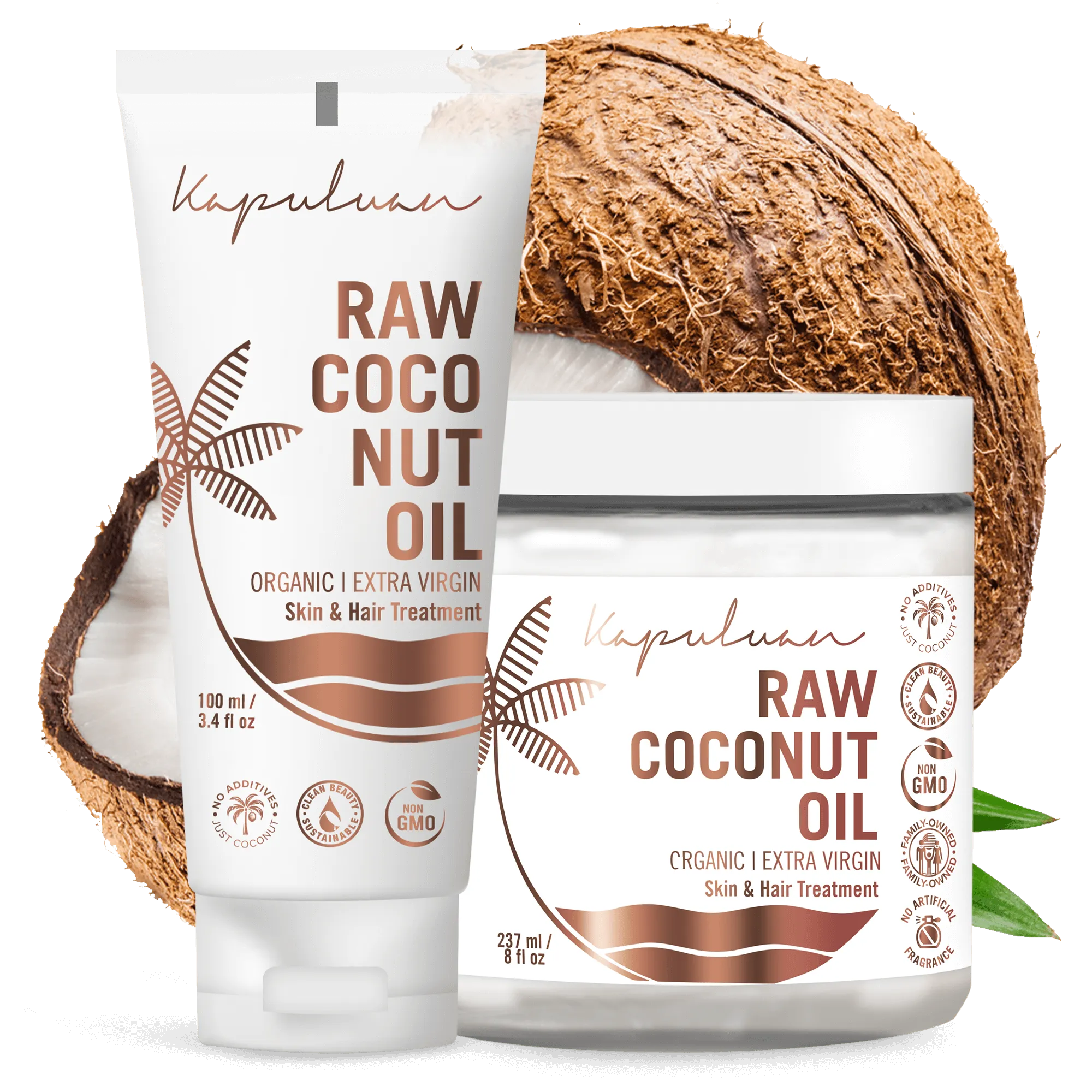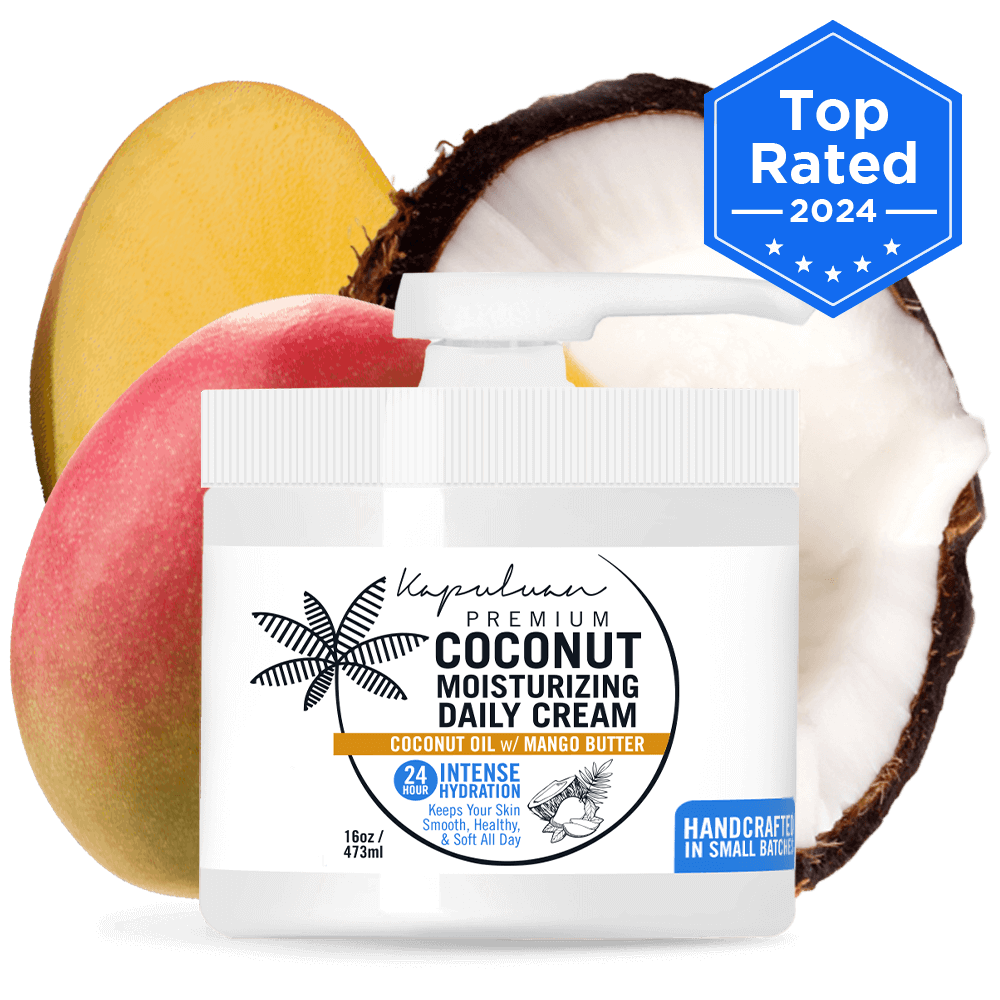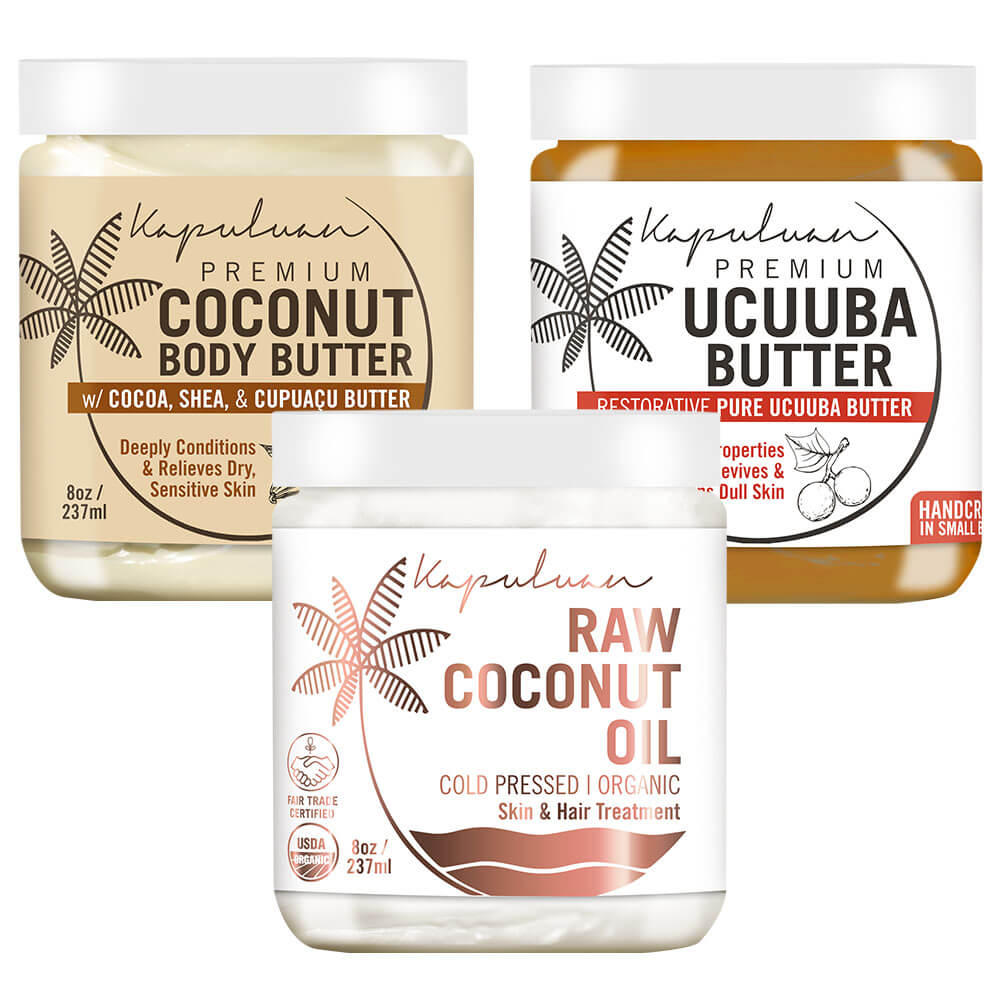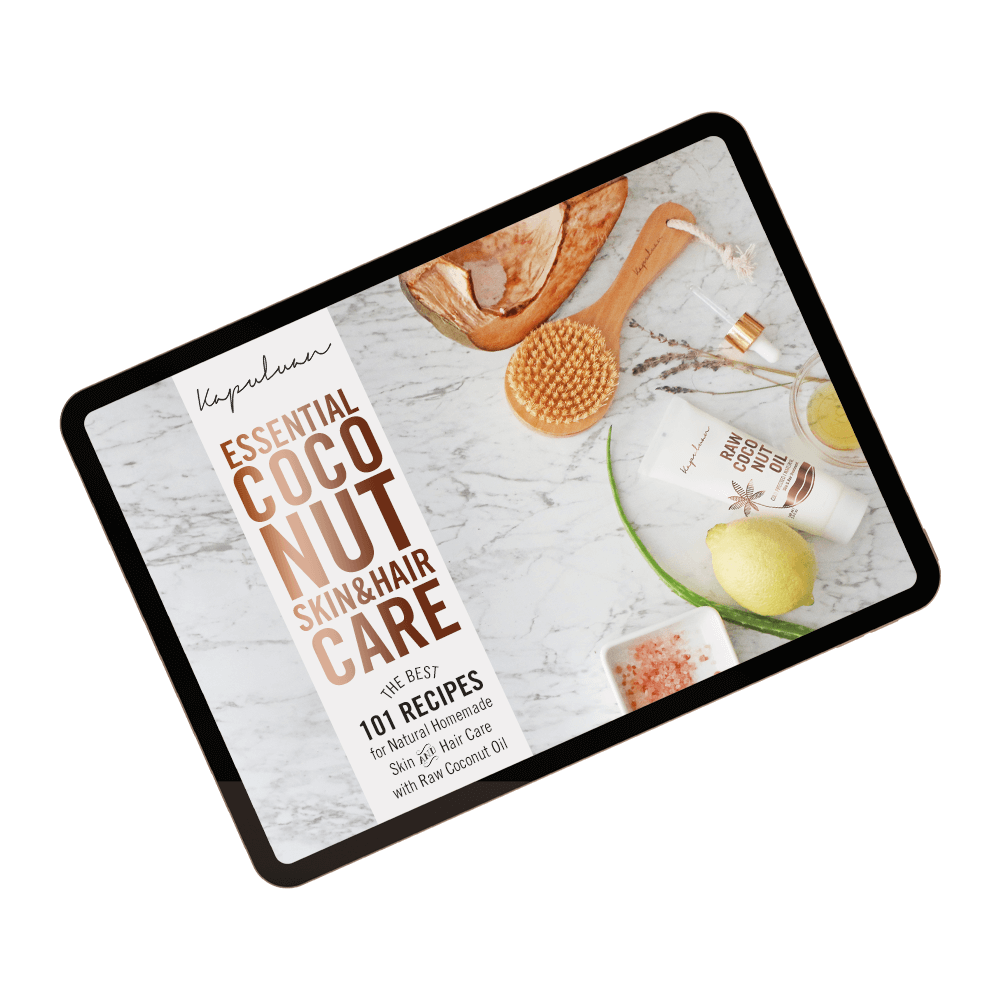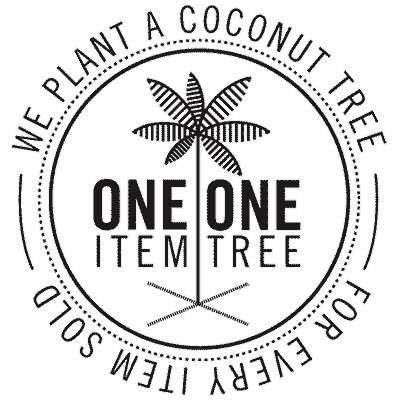Last Updated on October 19, 2024 by adeela
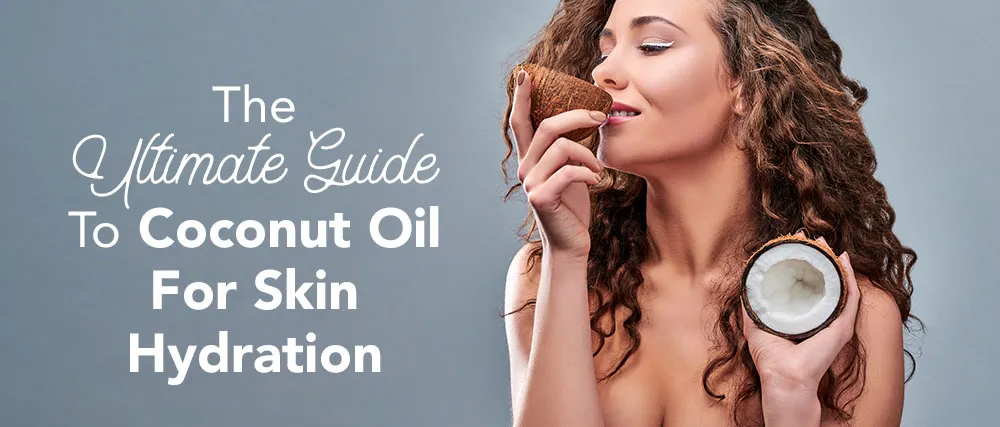
We’ve all chased that elusive secret to perfectly hydrated, glowing skin. From expensive skincare products to DIY recipes, we’ve tried it all in the quest for a supple, radiant complexion. Now let’s dive into the wonders of a natural moisturizer that’s been praised for centuries – coconut oil. Loaded with essential fatty acids and antioxidants, this tropical treasure has become a staple for many beauty enthusiasts around the globe.
But why is coconut oil creating such a buzz? What makes it an amazing hydrator for our skin? And how can we incorporate it into our existing skincare routine? We’re about to take you on an enlightening journey through the world of natural oils for skincare. This comprehensive guide will debunk myths surrounding natural oils, shed light on their science-backed benefits, and share useful application tips. Ultimately empowering you with knowledge and freedom to make informed decisions about your skincare regime.
As indicated above, coconut oil is the perfect intermediary step within your routine – offering hydration without overwhelming your skin. Of course, though, our skincare needs can change with the weather; Seasonal Skincare Changes are real and something we should adapt to. For instance, in dryer winter months, your skin is more dehydrated for moisture than ever.
Incorporating coconut oil into our skincare routine gives us that flexibility and freedom we crave. It allows us to easily adjust how much hydration we’re giving our skin depending on its needs at any given time – no need for multiple products! Its versatility doesn’t stop there either: use it as a makeup remover at night or as an intensive overnight treatment for extra dry areas like elbows and knees! With these insights on hand – integrating coconut oil into our existing skincare regime feels less like guesswork and more like a conscious choice toward healthier glowing skin!
Key Takeaways
- Coconut oil is a natural moisturizer with hydrating and glowing skin benefits.
- It creates a barrier to lock in moisture and protect against toxins.
- Coconut oil has antimicrobial properties that can help treat acne and inflammation.
- Proper application and consistency are key for achieving hydrated and glowing skin with coconut oil.
Understanding the Basics of Natural Moisturizers
Ever wondered why natural moisturizers like coconut oil work wonders for your skin’s hydration? It’s all due to the power of organic ingredients. These elements plucked straight from nature, are packed with essential nutrients and antioxidants that our skin craves. They penetrate deeply into the layers of our epidermis, delivering intense moisture and promoting overall skin health. Coconut oil, a staple in vegan skincare essentials, is a prime example. Coconut oil is one of the most effective natural moisturizers because it’s more than just hydrating. This tropical treasure is rich in fatty acids that help nourish dry or flaky skin by creating a barrier that locks in moisture and protects against environmental toxins. The lauric acid in coconut oil has antimicrobial properties that can help treat acne and soothe inflammation. So next time you’re looking for a way to quench your skin’s thirst, remember the ‘Organic Ingredients’ Impact on your skincare regimen. Reach for nature’s best – reach for coconut oil! Not only will you be feeding your skin with much-needed hydration, but you’ll also be embracing a kinder approach to beauty by opting for vegan skincare essentials like coconut oil. Your choice won’t just benefit your complexion – it reflects an empowering decision towards sustainable living and conscious consumption – freedom beyond superficial beauty standards!The Science Behind Hydrating Properties of Tropical Oils
Imagine yourself on a lush tropical island, basking in the sun’s glow and reaping the hydrating benefits of its rich, natural oils – it’s not just a dream but science at its best! Tropical oils are derived from various fruits, nuts, and seeds found in warm climates. They contain essential fatty acids that penetrate deep into your skin to replenish moisture levels. But what makes them so effective? How are they extracted? Let’s delve into the scientific brilliance behind these nature-derived moisturizers. We’ve got to discuss two key factors: ‘Oil Extraction Methods’ and ‘Tropical Oil Varieties.’ First off, extraction methods significantly influence an oil’s quality and potency.- Cold pressing involves mechanically squeezing out the oil without heat, thus preserving all nutrients.
- Expeller pressing uses pressure and minimal heat, which may degrade some nutrients but is still relatively gentle.
- Chemical extraction with solvents gets maximum yield but can leave harmful residue.
- Steam distillation uses steam to extract essential oils but could potentially alter their properties due to high temperatures.
- Coconut oil is famed for its high amount of medium-chain fatty acids that provide intense hydration.
- Avocado oil has a wealth of vitamins A, D, and E and monounsaturated fats nourishing the skin deeply.
- Argan oil boasts antioxidant-rich vitamin E and omega-6 fatty acids promoting healthy skin barrier function.
- Tamanu oil contains calophyllic acid, known for its anti-inflammatory effects beneficial for irritated or sensitive skin.
Proper Application Tips for Maximum Benefits
You’re about to uncover the secrets of maximizing the benefits of your tropical oil-infused skincare routine, right? The first secret lies in ‘Oil Quantity Control.’ Less is more when it comes to applying coconut oil. Begin with a small amount, perhaps a teaspoon or less, and gently rub it into your skin until fully absorbed. It’s important not to overdo it; excessive oil can lead to clogged pores and breakouts. And remember, different areas of your body may require different amounts of oil. For instance, our face usually needs less than our hands or legs. The second crucial factor is the ‘Time of Application’. To reap the maximum hydration benefits from coconut oil, we recommend applying it immediately after showering or bathing while your skin is still slightly damp. This method helps lock in moisture and leaves your skin feeling incredibly soft and supple throughout the day. For an added boost of hydration during drier seasons or climates, consider applying a thin layer before bedtime and let its nourishing properties work their magic overnight. So far, we’ve delved into Oil Quantity Control and Time of Application, two vital aspects for attaining moisturized, glowing skin using coconut oil. But here’s another tip – consistency is key! Incorporating this tropical wonder oil into your regular skincare routine will yield significant improvements. Regular use also promotes healthier-looking skin that’s resilient against everyday stressors. So take charge now! With these tips, nothing can stop you from achieving that hydrated skin you desire so much!Busting Myths About Natural Oils for Skincare
Let’s debunk some misconceptions about using natural oils in skincare, shall we? One common myth is that all-natural oils are alike and can be used interchangeably. This isn’t true. Oil’s effectiveness largely depends on its purity, hence the importance of oil purity in skincare. Pure coconut oil, for example, contains a high concentration of beneficial compounds that other oils may not have. Another widespread misconception is that oils will leave your skin feeling greasy or cause breakouts. In reality, when applied correctly and in moderation, pure natural oils like coconut can reduce excess sebum production and help prevent pimples while providing deep hydration to the skin. Let’s also dispel the idea that natural oils only benefit dry skin types. While they provide excellent hydration, these versatile elixirs can balance oily skin and even calm sensitive complexions by reducing inflammation. So you see, it’s essential to shed these skincare misconceptions to fully unlock the potential benefits of using coconut oil for skin hydration. By understanding how different natural oils function – their unique properties and optimal application techniques – we can make more informed decisions about our daily skincare regimen. It’s all about freedom from misinformation and freedom to choose what’s best for our skin based on knowledge rather than myths.Selecting Quality Products for Your Beauty Regime
Picking the right beauty products can be a game-changer, but it’s not just about brand names or trendy packaging. It goes deeper than that; it’s about what our skin needs to stay healthy and vibrant. Through careful ingredient analysis, we’ve discovered that coconut oil is an excellent choice for hydration. But remember, not all coconut oils are created equal! The quality of the product matters immensely when you’re seeking optimal results. Let us take a closer look at how to select quality products for your skincare routine through an understanding of packaging insights and key ingredients. The best coconut oil to use on your skin is organic, unrefined, cold-pressed virgin coconut oil. Unlike refined versions, unrefined coconut oil retains its natural healing properties with its rich content of antioxidants and fatty acids. When analyzing packaging details, ensure these descriptors are mentioned along with transparent labeling practices – like listing out all ingredients in simple terms. When choosing your next bottle of coconut oil or other skincare product, don’t merely fall for attractive packaging or big brand promises. Conduct thorough research into the product’s composition by critically analyzing ingredients and their benefits before making your selection. Trust us; investing a little time in this process will make all the difference in achieving radiant and well-hydrated skin!Integrating a New Moisturizer into Your Existing Skincare Routine
Introducing a new moisturizer into your current beauty regimen might sound tricky, but knowing the right way to do it is a breeze. Specifically, if you’ve chosen coconut oil as your new go-to hydrator, we can share a few tips to make this transition seamless. Moisturizer Layering Techniques play an important role here; not all products are created equal, and some may be heavier or lighter than others. So, where does coconut oil fit in? Typically, it’s best applied after serums and before heavier creams or lotions. To help illustrate this point properly, let’s consider this simple table:| Step | Product Type | Examples |
|---|---|---|
| 1 | Cleanse | Gentle cleanser |
| 2 | Treat | Serum, eye cream |
| 3 | Hydrate | Coconut Oil |

